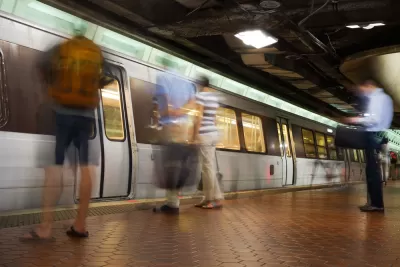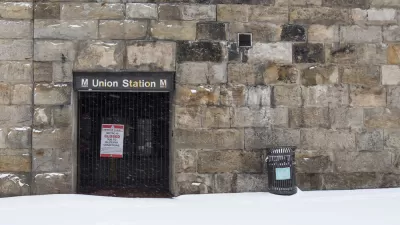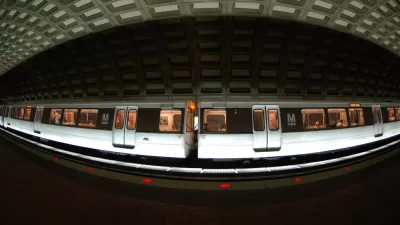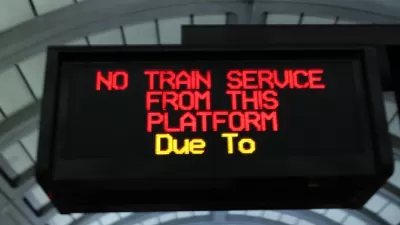Planning and urbanism writers in Washington, D.C. agree that a proposal to cut service to 20 stations in the Metrorail system would have harmful effects for minorities in the region.

"One cost-saving scenario Metro staff presented last week in discussions about how the agency might balance its budget includes closing 20 low-ridership stations during off-peak hours; Maryland and Virginia have seven stations each and six are in the District.
"Many of the stations are clustered on the eastern ends of the Silver, Blue, Orange and Green lines, in Prince George’s County and east of the Anacostia River in the District," adds Powers, before noting that all of these neighborhoods are home to communities of color.
Among the observers upset by the proposal was Metro board member Malcolm Augustine, who represents Prince George's. Powers describes Augustine as "livid" at the implications of the proposal.
Kriston Capps also noticed the troubling implications of the proposal in a post for CityLab, and added ridership figures to the evidence in the case against the proposal:
These stations may be Metro outliers for their lower ridership numbers. But throughout the system, mid-day ridership often rivals the morning or evening rush hours. (At no station does off-peak ridership beat both.) For stations east of the river, though, mid-day ridership accounts for a larger share of overall trips. Riders who use these stations, though relatively fewer in number, would be disproportionately inconvenienced by these specific service cuts.
Jonathan Neeley also analyzed the proposed service cuts, describing the proposal as draconian, harmful, and potentially harmful to Metro's already damaged reputation. In that post, Neeley also surveys the rest of Greater Greater Washington's writers for their opinion on the proposal, finding a chorus of consternation.
At least one potentially powerful federal regulation stands in the way of the proposed service cuts. The Powers article under discussion at the top of this post concludes with a reminder that Title VI of the Civil Rights Act requires "transit agencies enacting such significant changes in service [to] prepare an 'equity analysis.'"
FULL STORY: The 20 stations Metro could close during off-peak hours to save money are mostly in communities of color

Alabama: Trump Terminates Settlements for Black Communities Harmed By Raw Sewage
Trump deemed the landmark civil rights agreement “illegal DEI and environmental justice policy.”

Planetizen Federal Action Tracker
A weekly monitor of how Trump’s orders and actions are impacting planners and planning in America.

The 120 Year Old Tiny Home Villages That Sheltered San Francisco’s Earthquake Refugees
More than a century ago, San Francisco mobilized to house thousands of residents displaced by the 1906 earthquake. Could their strategy offer a model for the present?

In Both Crashes and Crime, Public Transportation is Far Safer than Driving
Contrary to popular assumptions, public transportation has far lower crash and crime rates than automobile travel. For safer communities, improve and encourage transit travel.

Report: Zoning Reforms Should Complement Nashville’s Ambitious Transit Plan
Without reform, restrictive zoning codes will limit the impact of the city’s planned transit expansion and could exclude some of the residents who depend on transit the most.

Judge Orders Release of Frozen IRA, IIJA Funding
The decision is a victory for environmental groups who charged that freezing funds for critical infrastructure and disaster response programs caused “real and irreparable harm” to communities.
Urban Design for Planners 1: Software Tools
This six-course series explores essential urban design concepts using open source software and equips planners with the tools they need to participate fully in the urban design process.
Planning for Universal Design
Learn the tools for implementing Universal Design in planning regulations.
Clanton & Associates, Inc.
Jessamine County Fiscal Court
Institute for Housing and Urban Development Studies (IHS)
City of Grandview
Harvard GSD Executive Education
Toledo-Lucas County Plan Commissions
Salt Lake City
NYU Wagner Graduate School of Public Service





























